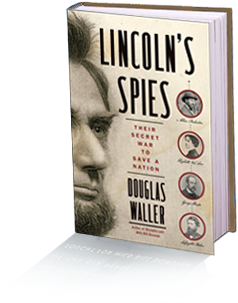|
Lincoln’s Spies: Their Secret War to Save a Nation is a story of espionage, sabotage and intrigue—and of a shrewd president who valued what his operatives uncovered.
From the tense days before Abraham Lincoln’s inauguration in 1861 to the surrender at Appomattox four years later, Lincoln’s Spies a riveting narrative of the heroes—and the scoundrels—who informed Lincoln and his generals and busted up clandestine Rebel networks. The book’s four spies are:
- Famed detective Allan Pinkerton, who succeeded in slipping Lincoln through Baltimore before his inauguration to foil an assassination attempt, but failed as General George McClellan’s spymaster, delivering faulty intelligence reports overestimating Confederate strength.
- Pinkerton rival Lafayette Baker, a handsome Union officer with a controversial past, who assembled a seedy retinue of disreputable spies, thieves, and prostitutes to root out traitors in Washington, D.C.
- Erudite New York lawyer George Sharpe, who succeeded Pinkerton as spymaster of the Union’s Army of the Potomac and ran highly successful intelligence operations that outpaced anything the enemy could field.
- Elizabeth Van Lew, a Virginia heiress who ran a Union spy ring out of her Richmond mansion and fed General Ulysses S. Grant critical military secrets as his army closed in on the Confederate capital.
Behind these secret operatives was Abraham Lincoln, one of our greatest presidents, who turned out to be an avid consumer of intelligence and a ruthless aficionado of clandestine operations, willing to take chances to win the war.
Among the revealing Civil War stories in Lincoln’s Spies:
- Allan Pinkerton used women to infiltrate Rebel social circles, he recruited runaway slaves to collect information, he infiltrated spies into Richmond, and he succeeded in breaking up a Confederate espionage ring in Washington. But Pinkerton ended up being a failure as a military intelligence officer. He fed McClellan wildly inaccurate intelligence reports that intentionally inflated the number of Rebel troops the Union general faced. Pinkerton also spied on Lincoln for political intelligence he thought might be useful for McClellan.
- Lafayette Baker, who set up his headquarters in an old two-story brick building on Pennsylvania Avenue near the U.S. Capitol, commanded some thirty detectives who put hundreds of suspected spies and thieves in jail, while pocketing cash from the graft they uncovered. Baker, who liked to brag that there was no hostile agent in Washington that he or his men didn’t know about, failed to uncover the threat to Lincoln in the city from John Wilkes Booth and his gang.
- Colonel George Sharpe pioneered what spy agencies today call “all source intelligence.” His bureau raked in information not only from Sharpe’s spies, but also from the reports of prisoner interrogations, from aeronauts flying in balloons over the battlefield, from signal officers intercepting Rebel telegraph messages, and from cavalry scouts on reconnaissance patrols. Sharpe’s officers then sorted and analyzed this flood of information to produce for Union commanders the most accurate and comprehensive picture of the enemy that they had ever had.
- Sharpe’s best operative in Richmond became Elizabeth Van Lew, who organized a sophisticated spy ring that Confederate security agents were never able to crack. Van Lew’s network churned out intelligence for Sharpe on Richmond’s defenses, the condition of Robert E. Lee’s army, Rebel troop movements through the Confederate capital, economic conditions in the city, and the morale of its residents. With each delivery of coded messages, Van Lew also included for Grant the latest editions of Richmond’s newspapers plus a rose picked from her garden.
Waller has written a richly detailed spy story that’s hard to put down. The setting is the 1860’s, but the story of clandestine operations resonates today. “The phone tapping, human collection and aerial snooping today’s U.S. spy community engages in can be traced to the Civil War,” Waller writes.
|
|
